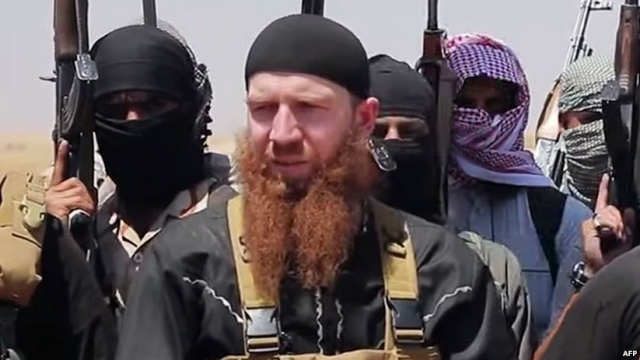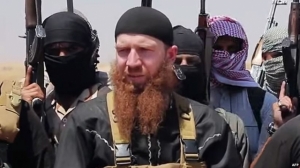Georgian-born ISIS Commander Reportedly Killed By US Drone In Syria
TBILISI –ISIS top field commander and de facto war minister Abu Omar al-Shishani has reportedly been killed in a US drone strike in Syria, officials in Washington said Tuesday.
Shishani, a Georgian citizen of Chechen extraction, was regarded as one of the Islamic State’s most effective military commanders and a close confidant of ISIS’ supreme leader, Abu Bakr al-Baghdadi.
Peter Cook, a spokesmen for the US’ Defense Department, said Monday the Pentagon will need more time to assess the results of the strike as actual intelligence on the ground remains unconfirmed.
The attack reportedly involved multiple waves of manned and unmanned aircraft that targeted Shishani near his base camp in the Syrian town of al-Shadadi, according to the Pentagon.
Shishani, whom the US had offered a $5 million reward for after being declared a specially designated global terrorist in September 2014, was likely killed along with 12 other militants, Pentagon officials said.
War ravaged al-Shadadi had served as Shishani’s base of operations since he took command of ISIS’ elite special operations battalions in late 2015.
The ginger-bearded Shishani had held several high ranking military positions within ISIS, including as a major field commander in several of the terrorist group’s most successful campaigns in 2013-2015.
Born Tarkhan Batirishvili in January 1986, he was raised in the impoverished village of Birkiani in Georgia’s isolated Pankisi Gorge, home to a 20,000-strong Chechen community.
As a teenager, Shishani – whose nom de guerre translates as Omar the Chechen – assisted and fought with the dozens of anti-Russian Ichkerian rebel groups who used Pankisi as a training and supply center during the brutal 1999-2001 Second Chechen War.
He later served in the US-trained Georgian armed forces and rose to the rank of sergeant. During the 2008 Russian-Georgian War, Shishani was part of a special reconnaissance unit during the Battle of Tskhinvali, charged with relaying the positions of Russian tanks while behind enemy lines.
Shishani was honorably discharged in 2010 after contracting tuberculosis, but later fell afoul of local law enforcement officials when he was arrested and served 16 months in prison for illegal arms possession.
Unable to find employment following his arrest, Shishani’s neighbors have said in interviews that he quickly turned away from the community after embracing a radical form of Islam known as Takfirism.
After arriving in Syria in 2012, Shishani took command of the al-Qaeda-linked Mujahireen Brigade and its successor Jaish al-Mujahireen wal-Ansar – units comprised mainly of Russian-speaking militants from the North and South Caucasus, including many who had combat experience in the bloody post-Soviet wars of the 1990s.
If confirmed, Shishani’s death would be a major blow to ISIS. His battlefield expertise and Russian language skills made him a formidable military and recruitment tool for the terrorist group.
Pankisi’s Chechens, who traditionally practice a moderate form of Sufi Islam, have experienced a major spike in the number of residents who have been radicalized and hope to follow in Shishani’s footsteps.
The beleaguered community has seen dozens of its youth leave for Syria in an attempt to join ISIS.
British and American intelligence services estimate that up to 3,000 Russian-speaking recruits currently serve the Islamic State, the overwhelming number of whom originate from the Caucasus.












